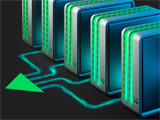IMDEA Networks

Archives: Events
This is Why Adtech Can’t Have Nice Things
By 2025 ad fraud will be the second largest form of organized crime, resulting in losses of up to $1 trillion in damages to the society, creating an unprecedented burden to national economies and tax payers.
Read more arrow_right_altUsing SDN/OpenFlow in real life networks
Programmable networks or Software Defined Networking (SDN) offers new opportunities to manage computer networks: Make networks smart, introduce new service faster.
Read more arrow_right_altStudying Human Behavior through Digital Traces: Polarization and Emotions in the Bitcoin Ecosystem
The availability of data on digital traces is growing to unprecedented sizes, but inferring actionable knowledge from large-scale data is far from being trivial.
Read more arrow_right_altMeasuring the Mixing Time of a Network
Mixing time is a global property of a network that indicates how fast a random walk gains independence from its starting point. Mixing time is an essential parameter for many distributed algorithms, but especially those based on gossip.
Read more arrow_right_altDesign and Implementation of Secure Distributed Systems and Networks
In this talk I present our research results in the field of network protocols for secure host authentication and mobility,...
Read more arrow_right_altEntrepreneurship in Startups and large companies
We have experienced an era in the world of innovation where the stars have been the entrepreneurs. Small startups or even individuals were able to turn their ideas into big business and, in many cases, overcome large companies with a long tradition in the market.
Read more arrow_right_altInforming Protocol Design Through Crowdsourcing: the Case of Pervasive Encryption
Middleboxes, such as proxies, firewalls and NATs play an important role in the modern Internet ecosystem. On one hand, they perform advanced functions, e.g. traffic shaping, security or enhancing application performance.
Read more arrow_right_altChallenges and Approaches to Mobility in Wireless Sensor Networks
Targeting an increasing number of potential application domains, wireless sensor networks (WSN) have been the subject of intense research, in an attempt to optimize their performance while guaranteeing reliability in highly demanding scenarios.
Read more arrow_right_altMobile edge-Networking Solutions and Data Offloading Mechanisms for 5G Systems
The increasing demand for ubiquitous, high-speed and high-performance Internet access challenges the economic viability of mobile network operators which cannot cope with the rate of increase of wireless traffic. Alternate means are considered to deal with the excessive traffic demand that exploit the increase of wireless networks in unlicensed parts of the spectrum, as well as of handheld devices with multiple radio interfaces.
Read more arrow_right_altIntegrating Smart Phones into Emergency Networks via Wi-Fi Tethering
In this talk, I will discuss an architecture called Energy Aware Disaster Recovery Network using WiFi Tethering (E-DARWIN). The underlying idea is to seamlessly integrate mobile devices carried by the people in a disaster area into the emergency response network by exploiting the WiFi tethering capability that is ubiquitously available in nearly all smartphones already.
Read more arrow_right_alt











Recent Comments